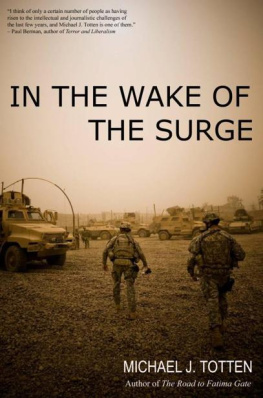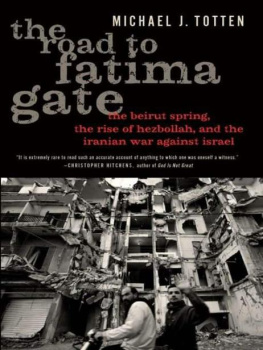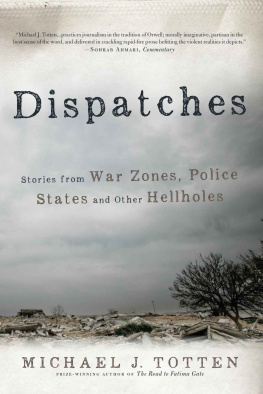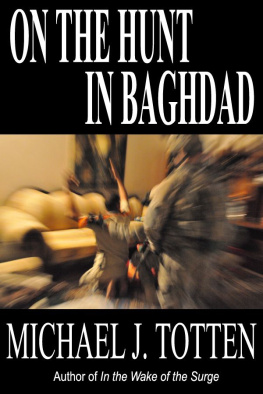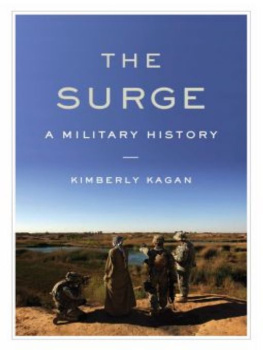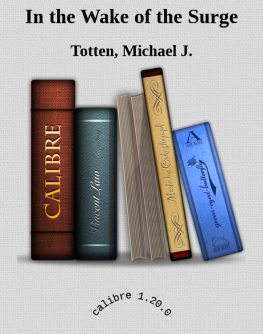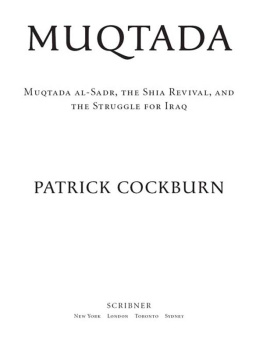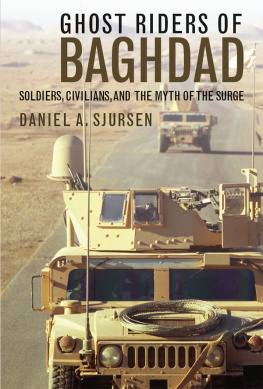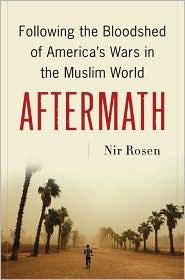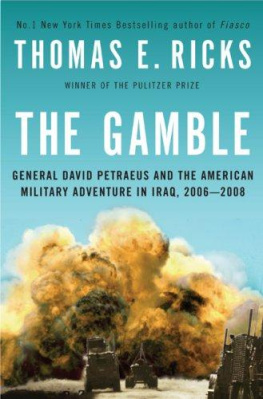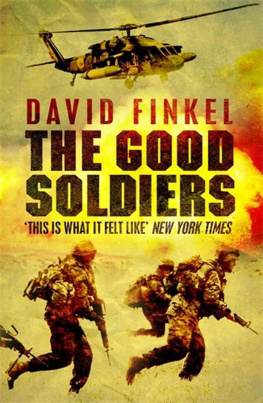In the Wake of the Surge
Michael J. Totten is a foreign correspondent and foreign policy analyst who has reported from the Middle East, the Balkans, and the former Soviet Union.
Hes a contributing editor at City Journal and writes regularly for Commentary . His work has also appeared in the New York Times, the Wall Street Journal , The New Republic , Slake: Los Angeles , Pajamas Media , the New York Daily News , City Journal , LA Weekly , the Jerusalem Post , Beiruts Daily Star , Azure , and Reason .
He won the 2007 Weblog Award for Best Middle East or Africa Blog, he won it again in 2008, and was named Blogger of the Year in 2006 by The Week magazine for his dispatches from the Middle East. He lives with his wife in Oregon and is a former resident of Beirut.
Visit his blog at www.MichaelTotten.com
ALSO BY MICHAEL J. TOTTEN
The Road to Fatima Gate
IN THE WAKE OF THE SURGE
MICHAEL J. TOTTEN
Copyright 2011 by Michael J. Totten
All rights reserved. No part of this publication may be reproduced in
any form or by any means without the prior written permission of
Michael J. Totten, PO Box 312 Portland, OR 97207-0312
First American edition published in 2011 by Belmont Estate Books
Cover photo by Zoriah Miller
ELECTRONIC EDITION
Totten, Michael J.
In the Wake of the Surge
ISBN-13: 978-0615508405
ISBN-10: 0615508405
For my parents
Contents
Introduction
PART ONE - KURDISTAN
1 Iraq Without a Gun
2 The Kurds Go Their Own Way
3 No Friends But the Mountains
4 Where Kurdistan Meets the Red Zone
PART TWO - BAGHDAD
5 Welcome to Baghdad
6 In the Wake of the Surge
7 Raid Night 88
8 An Iraqi Interpreters Story
9 Balance of Terror
10 The Road Up IED Alley
PART THREE - ANBAR AWAKENS
11 The Battle of Ramadi
12 Hell is Over 144
13 Hope for Iraqs Meanest City
14 The Rings on Zarqawis Finger
15 The Dungeon of Fallujah
PART FOUR - BAGHDAD REVISITED
16 On the Hunt
17 The Future of Iraq
Afterword
Introduction
Iraq made fools of just about everyone.
Those who thought the U.S.-led invasion in 2003 was a good idea were chagrined to discover that Iraqs dictator Saddam Hussein didnt have stockpiles of weapons of mass destruction after all. The most convincing explanation Ive heard yet for why so many intelligence agencies goofed it came from the tyrant himself. He needed to pretend that he didnt have them to avoid being attacked by the West, but he also, at the same time, needed to convince the Persians next door in Iran that he did have them to deter an attack from the east. So he told the world that he was defenseless, but he didnt dare let international weapons inspectors comb through his country to prove it.
So it goes in Iraq, and in the Middle East generally, where almost nothing is at it appears on the surface. Most Westerners who live there and work there eventually learn this the hard way. Most American presidents have to learn it the hard way, as well, if they ever, in fact, learn it at all.
The war opponents were right then, or at least partly, and at least for a while. For not only did Saddam Hussein not have caches of chemical and biological weapons, American and British soldiers found themselves sucked into an overlapping series of additional wars in Iraq, against the regimes former loyalists, against Abu Musab al Zarqawis Al Qaeda in Iraq, and against an array of Shia militias backed by Iran. The country held free and fair elections for the first time in its history, but that did not stop it from disintegrating into something that looked more like Afghanistan and Somalia than a model Arab democracy.
By 2006 almost everyone, including me, thought if something radical didnt happenand fastthat it would be best for the U.S. to just cut its losses and leave.
Something radical did, however, happen, and just at the last moment, too. After suffering a humiliating mid-term election loss based at least in part on the American publics Iraq war fatigue, President George W. Bush changed everything by placing a little-known general named David Petraeus in command. Not only did Petraeus send a surge of additional troops to Iraq, he transformed the American strategy there out of all recognition.
This time it was the opponents of the war who failed to see what was coming. Most figured the Petraeus strategy was doomed to fail just like everything else that had been tried. Some declared his effort a failure before he even had time to get started. Yet he led the American and Iraqi forces, against all odds and most expectations, to something that looked a great deal like victory.
I wrote the dispatches and essays that make up this book between 2006 and 2009 in City Journal , Reason , Azure , and on my blog, which you can find at www.MichaelTotten.com. You may notice some subtle shifts in tone as you read them. In 2006 I assumed, like most people did, that the U.S. was going to lose and that Iraq would be conquered by guerrilla and terror militias. Yet when I embedded with some of General Petraeus units in Baghdad, it struck me at once that he might pull this thing out of the fire. If anyone could fix Iraq, Petraeus could fix Iraq. And if Petraeus couldnt fix it, I doubted anyone could. I said so in print and caught some flack for it at the time, but hey, I was right. Or at least it seemed I was right for a while.
By 2009, my mood darkened somewhat again. Iraq remained a mind-boggling dysfunctional place even after the insurgency was more or less beaten. When I wrote the last piece that makes up this collection, I was not convinced that the country was truly out of the wilderness. Yet by the time this book was published, Iraq looked like an island of sanity and stability all of a sudden. Arab revolts had just swept away tyrants in Tunisia and Egypt while open rebellions met ruthless repression in Syria and Libya. Hardly anything was happening in Iraq. Not everyone liked the prime minister, but at least, unlike most other heads of state in the region, he was elected. And he did not have absolute power. Back in 2006, when the first of these dispatches was published, hardly anyone would have thought that Iraq would be one of the most stable countries in the entire Middle East five years later, but thats what happened.
I edited most of these dispatches slightly. They were written as stand-alone pieces, and I found, when rereading them all in one sitting, that some of the same background information came up again and again. I couldnt assume that everyone who read one piece in particular had read all the others, but I can now that theyre here in one place. So for the sake of readability, I took out my scalpel and cut.
I also made a few aesthetic adjustments, nipping some little things here and tucking a bit over there. For the most part, though, the material here appears as it did when I wrote it.
No one can know what comes next in Iraq, but I can tell you what I saw and what I heard during seven trips to that long-suffering country shortly before, during, and at the end of the surge. Together these seventeen snapshots of places in time tell the story of the Kurds, the Arabs, and the Americans in Iraq at a violent and wrenching time in that countrys history.
One reviewer described my first book, The Road to Fatima Gate , as a love letter to Lebanon. No one will think In the Wake of the Surge is a love letter. As Tony Horwitz wrote in Baghdad Without a Map , no one makes love to Iraq. I sincerely hope, though, that one day its people will emerge from the darkness and flourish.

